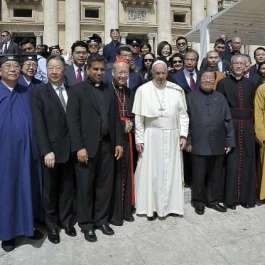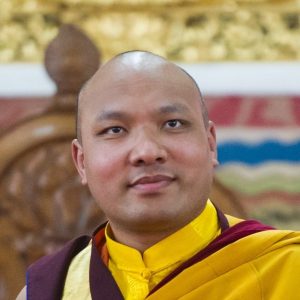
The Korean Seon (Zen) master Venerable Pomnyun Sunim (법륜스님) wears many hats: Buddhist monk, teacher, author, environmentalist, and social activist, to name a few.* As a widely respected Dharma teacher and a tireless socially engaged activist in his native South Korea, Ven. Pomnyun Sunim has founded numerous Dharma-based organizations, initiatives, and projects that are active across the world. Among them, Jungto Society, a volunteer-based community founded on the Buddhist teachings and expressing equality, simple living, and sustainability, is dedicated to addressing modern social issues that lead to suffering, including environmental degradation, poverty, and conflict.
This column, shared by Jungto Society, presents a series of highlights from Ven. Pomnyun Sunim’s writings, teachings, public talks, and regular live-streamed Dharma Q+A sessions, which are accessible across the globe. The following teaching was given in Virginia on 5 May 2024. This article is the sixth in a special series taken from Ven. Pomnyun Sunim’s 2024 Dharma tour of Asia-Pacific, Europe, and North America. Titled “Casual Conversation with Ven. Pomnyun Sunim: Come Talk about Life, Wisdom, and Happiness,” the Dharma tour ran from 29 April–21 September 2024, with Dharma talks scheduled in five countries—Australia, Canada, Germany, Japan, and the United States.**
The heightened risk of nuclear war on the Korean Peninsula
Ahead of the Dharma Q&A, Ven. Pomnyun Sunim headed to meeting with American security expert Olin Wethington. Wethington, who formerly worked at the Treasury Department, is a director of the Atlantic Council, a US think tank specializing in international affairs. He has served as a special envoy to China, an advisor to the secretary of the Treasury, deputy under secretary of the Treasury for international affairs, and a special advisor to the US president at the White House Economic Policy Council.
After a warm exchange of greetings, Wethington sought Ven. Pomnyun Sunim’s wisdom: “I think the most dangerous place in the world is the Korean Peninsula. We need a peaceful solution. That’s why I want to hear your opinion on this issue. Right now, the war between Ukraine and Russia may be a bit more of a priority. However, when looking at the Global Risk Index, I think the risk of war on the Korean Peninsula is a very serious problem.”
Before responding to Wethington’s question, Ven. Pomnyun Sunim first shared why he became involved in advocating for peace on the Korean Peninsula: “I originally intended to become a scientist, but in my first year of high school, I became a monk due to the influence of a monk from a temple near my school. Consequently, I did not have the opportunity to study in the US, so I do not speak English. I apologize that we have to communicate through an interpreter.
“I regard Buddhism not as a religion but as a practice for governing one’s mind. I hope that people can live happier lives without suffering, which is prevalent in our society. This has led me to engage in various social issues. My involvement with the North Korean issue began when there was a massive famine there, and I felt compelled to help them. I am from the southern part of South Korea, and I had never experienced or suffered from war. However, during a historical tour to China, I met North Korean refugees and learned about their suffering, which prompted me to start my humanitarian efforts. And I began visiting the US frequently and informed the world about people’s suffering from famine in North Korea.
“I believe that while we can criticize the country of North Korea, its people have the right to receive humanitarian aid. Initially, my activities mainly involved investigating and informing the Western world that more than two million people had died of starvation in North Korea. Since many North Korean refugees fled their country because of the famine, I began to help them. I appealed to various international organizations, including the UNHCR, to solve this issue, but they could not assist unless China recognized them as refugees. Therefore, our team members were arrested by the Chinese government while helping North Korean refugees at the border. I also facilitated the entry and settlement of North Korean refugees in South Korea.
“Through these activities, I realized that without resolving the peace issue on the Korean Peninsula, the North Korean government cannot focus on improving human rights or alleviating the suffering of its people. Therefore, I became involved in the peace movement. Since the North Korean government had to prioritize national security, it was inevitable that human rights violations and suffering from hunger among its people would continue. Thus, I worked hard to facilitate the Six-Party Talks while having numerous discussions with Ambassador Joseph DeTrani, who was then the special envoy to North Korea. I also collaborated extensively with Andrew Natsios, the head of USAID, to address North Korea’s famine issue.
“My original focus was on humanitarian support and resolving human rights issues of the North Korean people, but since the root cause was the peace issue on the Korean Peninsula, I established The Peace Foundation to research and work on peace issues on the peninsula with many researchers.
“As you mentioned, there is a high risk of war on the Korean Peninsula. Although a war has not broken out yet, if it does it will inevitably cause astronomical damage not only to Korea but also to neighboring countries. Currently, the relationship between North and South Korea is very tense with the cessation of dialogue between North Korea and the US. Therefore, I met with senior Japanese politicians last February to discuss improving relations between Japan and North Korea, which I believe is very important in easing the tension. As you mentioned, we must find a way to prevent war from ever occurring again on the Korean Peninsula.
“Currently, the greatest threat is the continual advancement and increasing quantity of North Korea’s nuclear capabilities, facilitated by military cooperation between North Korea and Russia. How we can mitigate this is a critical issue. I believe that the current U.S. policy of strengthening military cooperation between South Korea, Japan, and the US serves as a military response to North Korea’s military threats but does not effectively prevent the proliferation of weapons of mass destruction. I believe it may even exacerbate the situation.”
Wethington sought Sunim’s perspective regarding solutions to North Korea’s accelerated nuclear development, especially appreciating his efforts in holding dialogues with Japanese politicians on the North Korean nuclear issue.
Sunim noted that both hardline and conciliatory policies toward North Korea had not been effective and offered advice on what policy the US government should adopt: “North Korea’s position has changed significantly. China and Russia hold different opinions from the US in the UN Security Council, and currently, North Korea is obtaining most of what it wants through Russia, thus reducing the need for dialogue with the US. Above all, through Russia, North Korea has been gradually obtaining the core technologies of weapons of mass destruction that it had not been able to develop. This is posing a significant threat to South Korea, Japan, and the US.
“First, North Korea’s nuclear development must be stopped. In the past, normalization of North Korea-US relations was seen as an exit strategy for denuclearization, but now, due to changed circumstances, it should be considered an entry strategy. Quickly ending the war between Russia and Ukraine is also one way to improve the situation. However, that is not easy at the moment. Easing the conflict between the US and China is another way, as it would also delay the improvement of relations between North Korea and China. But that too is not easy at present. Therefore, I believe the fastest route is for the US to negotiate directly with North Korea. Regardless of which administration takes office in the US, they should not leave North Korea to its own devices but should intervene more actively and engage in negotiations to prevent the spread of weapons of mass destruction.
“If war breaks out on the Korean Peninsula, it is highly likely to be a nuclear war. If there were to be a war, North Korea would be planning for a nuclear war. Thus, although the war between Russia and Ukraine is an immediate concern, I completely agree with your point that a war on the Korean Peninsula poses a far more serious risk. The current policy of the Biden administration, which leaves North Korea to its own devices, is leading to continuous nuclear proliferation.”
“I completely agree with you,” Wethington afformed. “I think many Americans should listen to you.”
Ven. Pomnyun Sunim then headed for the scheduled Dharma Q&A, where he warmly greeted the volunteers and headed to the main hall. He received a warm round of applause from the 300 attendees as he took to the stage and gave his opening remarks.
Ven. Pomnyun Sunim: Typically, when you visit a temple, the monk sits on the Dharma seat, and people sit on the floor to converse. This can make the atmosphere somewhat stiff, preventing people from freely sharing their stories. In the old days, they used to move the Dharma seat out of the hall to create a more comfortable setting for conversation. This allowed people to freely discuss various topics. This was called “yadan-beopseok.” Yadan-beopseok does not mean “noisy;” it refers to a Dharma conversation held outdoors. Today’s setting is exactly like that of a yadan-beopseok. So, let’s begin our yadan-beopseok.
I bring stress from work home with me
Q: I’ve been working for about seven years, but I still end up bringing home negative feelings from the office. How can I learn to be indifferent to these feelings?
Ven. Pomnyun Sunim: What happens at work?
Q: When I receive feedback from my boss to correct something I’ve done, it’s hard for me to think, “I’ll just make the correction.” Instead, I end up blaming myself, asking, “Why couldn’t I do it right in the first place?” This feeling continues even at home. I wish I could just let it go.
Ven. Pomnyun Sunim: You are asking me if there is a way for you not to take home the negative feelings you felt at work. You simply shouldn’t take them home with you. (Laughter)
But you’re asking me because it seems like they automatically follow you, right? I can only tell you that there really is no other answer. You simply shouldn’t take them home, but since you say you can’t help it, the solution is to make sure such feelings don’t arise at work in the first place. You need to create a situation where there’s nothing to take home. If your boss tells you to correct something, just say, “Yes, I will,” and make the correction. Why take it as a problem? There’s no need to be hurt by your boss’s comments. I think we should talk about this a little more.
Q: Yes, I wanted to ask you why I feel hurt by my boss’s feedback. It makes me feel inadequate.
Ven. Pomnyun Sunim: If someone tells us to correct something we did wrong, we should just fix it, right?
Q: Yes, that’s correct.
Ven. Pomnyun Sunim: Everyone makes mistakes. It’s a problem if you rationalize your faults by thinking, “Am I the only one who makes mistakes? Don’t you make any?” However, if you admit, “I made a mistake,” then there is no problem. There’s no one in this world who does everything right. Even I make mistakes sometimes. There are instances when I insisted that I was right only to find out later that I was wrong.
Q: Do you not blame yourself when that happens?
Ven. Pomnyun Sunim: What does it mean when you blame yourself? If you know that you are someone who can make mistakes, then when you do make a mistake, you accept it by saying, “It’s okay to make mistakes,” and simply say, “I made a mistake.” But you blame yourself because you think, “I am someone who can’t make mistakes.” If you think you can’t make mistakes, but you do so, that’s when you blame yourself. Do you think you’re someone who can’t make mistakes? You must be a very remarkable person. (Laughter)
Q: That’s not the case.
Ven. Pomnyun Sunim: You’re subconsciously presuming that you can’t make mistakes. But are you really someone who can’t make mistakes? Or are you someone who can?
Q: I’m someone who can make many mistakes.
Ven. Pomnyun Sunim: So, what’s the problem if someone who can make mistakes does so? If your boss points it out, just say, “I made a mistake. I’ll do better next time.” Then, there’s no harm done. That means there is nothing to take home. You still look like you haven’t resolved the issue. If you have more questions, go ahead.
Q: Logically, I understand, but emotionally, it’s not that easy.
Ven. Pomnyun Sunim: Between reason and emotion, which do you think is correct?
Q: I’m not sure.
Ven. Pomnyun Sunim: When we make decisions, we’re told not to be too emotional and to be rational in our decisions. When you do something mindfully, it’s considered rational; when you do something mindlessly, it’s considered emotional, right?
Q: Yes, that’s right.
Ven. Pomnyun Sunim: Then, is it better to do things mindfully or mindlessly?
Q: It’s better to do things mindfully.
Ven. Pomnyun Sunim: If you’ve been doing something mindlessly and then realize you made a mistake, you can just say, “I made a mistake.” When you make a mistake, you shouldn’t blame yourself but acknowledge it. Saying, “I made a mistake,” doesn’t mean you’ve committed some grave sin. It doesn’t mean you’re deficient. Everyone can make mistakes. It’s just a matter of making more or fewer mistakes. There isn’t much of a difference. The reason you feel guilt or a sense of inferiority is that you unknowingly assume that you can’t make mistakes. If you think you can’t make mistakes, then when someone points out your mistakes, you feel hurt and shocked. So, from today, what kind of person should you consider yourself?
Q: Someone who can make mistakes.
Ven. Pomnyun Sunim: Is it normal for someone who can make mistakes to make mistakes, or is it abnormal?
Q: It’s normal.
Ven. Pomnyun Sunim: You’re a normal person, so there’s no need for you to blame yourself or feel guilty.
Q: Yes, thank you.
After two hours, the Dharma Q&A ended with a round of applause, and Ven. Pomnyun Sunim began signing books on stage, exchanging greetings with each person. One well-wisher told Sunim: “I was at a point where I wanted to die, but your teachings saved my life. Thank you.”
* Buddhist Monk Ven. Pomnyun Sunim Awarded the 37th Niwano Peace Prize (BDG)
See more
Pomnyun
Jungto Society
JTS Korea
JTS America
International Network of Engaged Buddhists
Related features from BDG
Enabling Everyone to Live Happily
Finding Good News in Difficult Situations
Raising Healthy Children
If You Know the Truth as It Is, There Is No Reason to Suffer
Exercise Your Right to Lead a Happy Life
Why Buddhism Is Essential for Modern People
Walking a New Path
Give Peace a Chance
Related videos from BDG
Dharma Q+A with Ven. Pomnyun Sunim
Wisdom Notes from Ven. Pomnyun Sunim

























